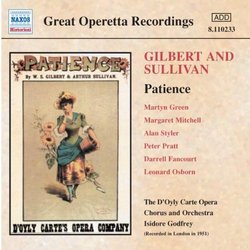Not the best but of great historical and musical interest
F. Behrens | Keene, NH USA | 10/23/2003
(5 out of 5 stars)
"After the incredible success of "HMS Pinafore" and "The Pirates of Penzance," Gilbert decided to expand an old Bab Ballad of his called "The Rival Curates" into the next Gilbert & Sullivan operetta. But after he sent his copy in to the Censor, he grew nervous about making fun of the clergy and changed the two male leads into aesthetic poets of the Oscar Wilde type. So while the actual targets need a lot of footnotes today, the concept of worshipping heroes who really have nothing to offer is as fresh today as it was in Gilbert's day. The first recording of the complete musical score was an acoustic one in 1921 with a cast drawn partly from the D'Oyly Carte troupe and partly from the singers contracted to the recording company. The electric recording of 1930 is (to me) the best of them all, with non-D'Oyly Carte singer George Baker as the comic lead. The 1951 mono LP cast Martyn Green in that role, but that yielded to the 1961 stereo recording with John Reed and the full dialogue. The 1962 version with the Glyndebourne Opera forces is quite good also, certainly vocally superior to the other sets but not quite dramatically so.It has been a long time since the Martyn Green set was available, and now it has joined "Pinafore," "Pirates," "Mikado," "Gondoliers," and "Iolanthe" in super-budget CDs put out by Naxos. Green (Bunthorne) is supported by Margaret Mitchell (Patience), Ella Halman (Jane), Alan Styler (Grosvenor), Darrell Fancourt (Col. Calverly), and the rest of the singers then currently with the company. Although all past editions of this version have credited the tenor lead to Leonard Osborn, for the first time tenor Neville Griffiths is listed as singing the Duke in Act II after Osborn became ill during Act I. Those who have never heard this work will find some of Sullivan's loveliest melodies and some of Gilbert's most cutting wit. (But we can say this about every one of their collaborations except for the last two!) Still, G&S buffs will certainly want to add this to their collection for the characterization that Green brings to his role. But also try to get the 1930 version. But for now, thanks to Naxos for making these Martyn Green sets available at more than reasonable prices."
Excellent performance in 1950s sound
L. E. Cantrell | Vancouver, British Columbia Canada | 12/27/2003
(4 out of 5 stars)
"As usual, I agree with the learned Mr. Behrens, although I am not as convinced as he as to the superiority of the 1930s performances, paticularly since the earlier set has a somewhat sub-par soprano performing the role of Patience.
This is a music-only version very conveniently presented on a single disc. The 1950s sound places the voices forward, just as they are in my memories of performing these pieces many years ago with the Lamplighters of San Francisco (now in their 52nd year and still going strong!)
To me, this is the recording of choice for Patience.
For those of you who must place the mechanics of sound reproduction over performance, the later, stereo version by the D'oyly Carte Company sounds fine. I haven't yet come across a copy of the current DC Company's digital Patience--I assume there is one. The others in the current series are very well-mastered but, to my ears, do not offer overall performances quite on a par with those of the 1950s cast."
D'Oyly Carte "Patience"
John Welch | Los Angeles, California, USA | 03/31/2007
(4 out of 5 stars)
"During WW2, when Martyn Green was in the RAF, baritone Graham Clifford replaced him as the lead 'patter' singer with the D'Oyly Carte. As mid-teenagers enjoying our first theatrical experiences, I and my friends thought Clifford a wonderful performer. (Incidentally, I have always felt that he never received due credit for his great part in helping keep the Company afloat during those war years.) I have to admit that when Martyn Green returned to the Company after war service, it took a little time for us to fully appreciate his talents and his interpretations of the 'patter' roles. I soon came to consider Bunthorne one of his finest, and we are now fortunate to have this "Patience" on CD as well as the other G & S recordings made by Decca in the same period. Also, let us not forget the great contributions of all the other D'Oyly Carte stalwarts of the period - the post-war Golden Age of the Company! 'Technical experts' may have reservations regarding the sound quality of these transfers, but those are of much less importance to me than the fact that I can now slip a CD into the player in my car - even though I still have and occasionally play the original LPs!"

